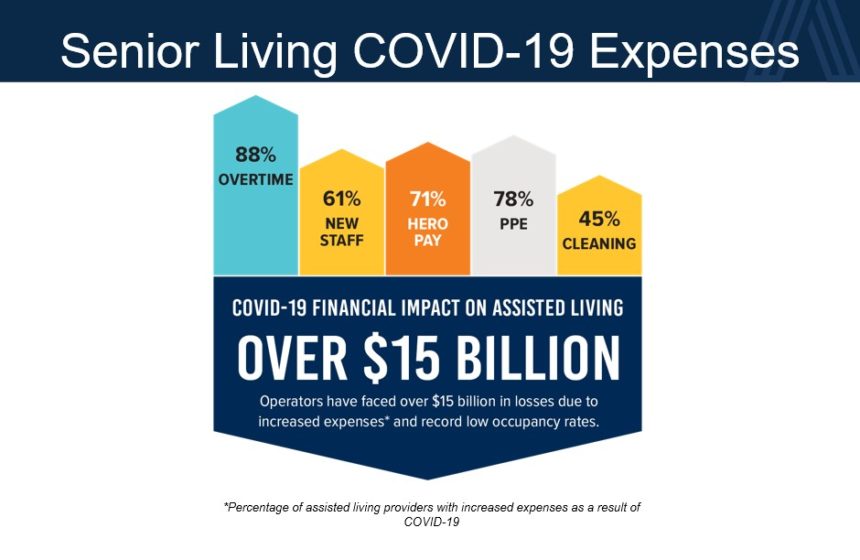Assisted living operators have faced more than $15 billion in COVID-related expenses, due staffing and supply issues, according to Argentum. (Credit: Argentum)
COVID-19 changed everything for senior living. It also should change the industry’s federal advocacy efforts, including a message to bring targeted dollars to providers.
That is what Argentum Senior Vice President of Public Affairs Maggie Elehwany communicated Sunday to attendees of a session at the National Association for the Support of Long Term Care’s 32nd Annual Meeting in Washington, D.C.
“We can no longer sit back and think we have to play defense,” Elehwany said. “COVID changed everything. It has to change the way we interact with Congress, how we care for our seniors.”
Although the senior living industry has faced unprecedented COVID-related challenges — federal testing and vaccination, worker shortages, occupancy losses, limited personal protective equipment, and inadequate federal relief — it also saw unprecedented opportunities in the form of federal and state spending at all-time highs and a desire to invest in senior care and workforce needs, she said.
Assisted living enjoyed a long history of being “off the federal government’s radar screen,” given that the industry primarily is regulated at the state level, Elehwany pointed out. But that status became a major challenge as the industry struggled to care for vulnerable older adults without the benefit of federal relief dollars pouring into skilled nursing and other healthcare providers, she said.
“Over and over, Congress passed relief for senior living facilities that did not include assisted living and memory care facilities,” Elehwany said. Assisted living operators ultimately became eligible for Coronavirus Aid, Relief, and Economic Security (CARES) Act Provider Relief Fund monies but have received less than 0.4% of awards, according to Argentum. And now, the industry is being passed up again, she said.
Although assisted living providers can apply for Phase 4 of the funds, they are competing with other providers for only approximately $13 billion in funding. Not targeting this final amount of relief to frontline caregivers who have been disproportionately left behind since the beginning is “simply unconscionable,” Elehwany said.
Argentum’s advocacy priorities, she said, now are focused on securing financial relief, improving the workforce shortage crisis and preventing “harmful” federal regulation of the industry. The association’s message, Elehwany added, now is, “Don’t leave us behind again.”
“What we need to do is really speak in a voice that can help those who can’t get their voice heard, to make sure their choice in care is protected,” she said, adding that senior living providers speaking with policymakers can talk about the importance of maintaining options for older adults — allowing them to age the way want in a safe place, with access to social interactions, nutrition and medication support.
“When you can make connections of why they should care, it makes a difference,” she said.



